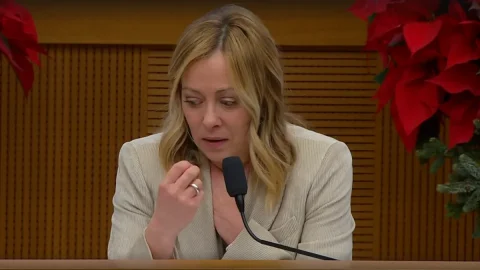The New York Times called it the 'Philosopher Chef'. In 2015, the New York Buddhist chef Éric Ripert invited her to New York to cook in the restaurant Le Bernadin and, in 2017, she became famous to the general public after appearing in an episode of Chef's Table on Netflix. This year has won Asia's 50 Best Restaurants Icon Award 2022.
Who is it Jeong Kwan, where the Korean cooking nun comes from and how she became famous
Jeong Kwan is a Buddhist nun from Yeongju, South Korea, at seventeen he decided to leave home to live with the Zen nuns in the hermitage of Chunjinam. And here she prepared meals for the monks and temple visitors using ingredients grown in the garden and preserved with drying and fermentation techniques, implementing the concept of cooking as meditation.
Today he is an international celebrity who travels the world comparing himself with the greatest starred chefs. Jeong Kwan is now arriving in Italy for a series of meetings with chefs, cooking schools and courses open to the public.
Il first date of the nun's busy schedule of commitments is expected at ALMA – The International School of Italian Cuisine, here Jeong Kwan on July 18 held a cooking lesson reserved for students of the School in the heart of the Food Valley. Next, the signature dinner with Sara Nicolosi and Cinzia De Lauri, two ALM graduate chefsAt and today at the helm of the Milanese restaurant Altatto, where they offer vegetable and sustainable cuisine.
Jeong Kwan in Italy, the stages
On July 19 the nun will stop at Milan by chef Pietro Leemann of the Joia restaurant – the first vegetarian restaurant in Europe to be awarded a Michelin star and the only vegetarian starry in Italy – to make gods four-handed dishes which will be documented in a video available on the Korean Cultural Institute's YouTube channel.
On the days of 21 and 22 July the "philosopher chef" will go down to Rome at the Eatal headquartersy where she will be involved in two events open to the public, to raise awareness of the link between vegan Korean cuisine and Buddhist philosophy.
In particular, on 21 July at 19.00 will be held the practical cooking class to prepare browned shiitake mushrooms in rice syrup, Korean-style seasonal vegetables and Dubu jang, a tofu-based dressing. Roslato is the recipe that Jeong Kwan talks about on Netflix and to which she is very attached since it was the last dish she cooked for her father when he went to visit her in the temple to convince her to go home. Her father, after tasting it, realized that there must be a sense of peace in her lifestyle and said to her: "I'm going home without worries, take care of yourself" and after a week she died.
The following day, always at 19.00, you can take part in the evocative ceremony of Baru Gongyang, the monastic meal that is eaten in wooden bowlsno, call baru in korean. A meditative ritual during which vegan dishes typical of the cuisine of Buddhist temples will be served based on rice, soups and side dishes that each participant can taste in their own baru. Nun Jeong Kwan will give all participants a truly unique experience that has been handed down for millennia in Korean Buddhist temples.
Places for both activities are limited, to participate it is possible to consult the Eataly Rome website.
Buddhist temple food to communicate with the world and the Baru Gongyang ceremony
"I communicate with the world through Buddhist temple food. I was in Italy in 2019 thanks to the Korean Cultural Institute and I am very happy to come back this year. In my meetings I will talk about the philosophy of Buddhist temple cuisine through Baru Gongyang and the recipes to which I am very attached,” says the nun.
In the Chunjinam Baekyangsa temple, in South Korea, the nun follows the rhythms of the days and the seasons and carries forward the ancient Buddhist culinary culture and the dictates of the peasant and traditional cuisine of Korea. According to Buddhist teachings, preparing and sharing food are part of the practice and, thus, Jeong Kwan cooks simple and tasty dishes for the monks and visitors to the temple using seasonal vegetables and flowers, the spices of which he knows all the peculiarities and oldest techniques of conservation and fermentation.
In the temple cuisine all animal foods are forbidden, except some lactic foods, and also the 'Osinchae' (garlic, allim tuberosum, spring onion, Korean chives, asafoetida) because they interfere with meditation. Plus, it's one cuisine that lives in harmony with nature and fights against all forms of food wastee.





